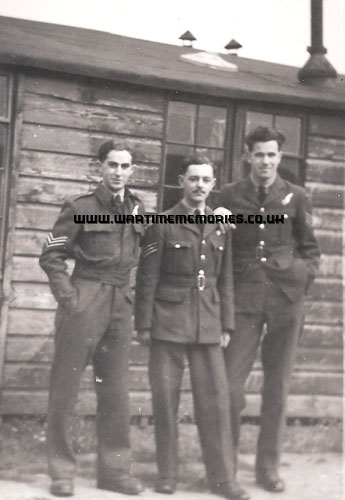Sgt. Arthur John Pickering Stamper
Royal Air Force 7 Squadron
from:Bath
My father, John Stamper was a navigator. Having trained in Florida, USA and at RAF Waterbeach on Wellingtons, he moved on 19th of Februaru 1943 to 1651 Conversion Unit at Waterbeach on Stirlings Mk1, and to new satellite aerodrome at Turweston. Training included night flying. It would appear, that this was training for Pathfinder duties, not standard bombing. The original crew were Sgt Petrie Pilot from New Zealand, Sgt Stamper Navigator, Sgt Rose Bomb Aimer, Sgt Edmonds Wireless Operator, Sgt Seery Rear Gunner from Australia Sgt Hartshorne Flight Engineer and name not remembered of the Mid-upper Gunner.
Total day flying at Waterbeach etc 11 hrs 50 mins, night 1.30 [I think these figures by dad way off as total flying hours in training 194 hr 45 mins. Above it says he did 97 hrs 30 mins at Chipping Norton. This leaves almost 100 hours unaccounted for, which seems a more likely total for training on Stirlings at Waterbeach.
Apparently dad told mum that they were lined up to convert to Lancasters in the near future, presumably with 7 Squadron, this transfer happened in May 1943. Stirlings were generally withdrawn from front-line duties in late 1943. At some stage in his training dad was involved in testing one of the versions of the Gee radar system, which was upgraded and refined after its introduction in 1941 or 42. Dad told me that on one occasion with some high-level observer(s) on board he had to locate the chapel of King's College very precisely.
On 26th of March 1943, apparently the last day before operational flying was due to start with the Stirlings, the undercarriage collapsed on take off on a dummy bombing run on Hull. Cross-country runs typically preceded operational flying. Dad banged his head badly, and ended up with his feet tangled in the wiring. He performed a difficult, panicked exit from the plane, with the danger of fire. He suffered headaches and with no flying for six weeks, he was working in the navigation office and saw some sort of personnel file where he'd been recommended for promotion to Pilot Officer. But he had been ticked off by the station Commander for nosing around in his paperwork. It is not known what happened to the recommendation.
The log book suggests he left Waterbeach on 25th of May 1943. In all (according to his maths), he had flown 194 hours 45 mins while training in England.
Then he spent three months in Northfield Military Hospital, Birmingham. Mum remembers him saying that after the crash he was too shaken even to get on a bus as that involved leaving the ground. Northfield was famous for its pioneering psychiatric work on RAF patients in Second World War. Then there was a stint at the War Office Officer Assessment at Catterick, involving assault courses etc. He didn't feel he had any aptitude for leadership, as he was too young and green, and was still dicky from the crash. He was transferred to Royal Signals and served in the War Rooms under Whitehall, and later at Droitwich, on wireless signalling.
Sgt Petrie, and others from dad's crew, were shot down and killed flying a Pathfinder Lancaster six months later, on night of 16th/17th of December 1943.
